Former border guard officer and current abbot of Nekresi Monastery Anthony (Pavliashvili) tells us why he chose monastic obedience instead of a military career and how he became a monk, about the providence of God in his life, about the miraculous help of St. Gabriel (Urgebadze), about his monastery and about the help of God in its construction.
The main battle is spiritual
I am the abbot of a monastery named for the holy martyr Abibos of Nekresi. There are twelve brothers in our monastery: eight monks, one hieromonk, two novices, and myself.
How did I come to God and become a monk? You know, I have been obedient since my childhood. Our family was believers, and as far as I remember, I always tried to be obedient to my parents and God. But we lived in a village, and there was no church nearby.
After school I entered the military academy, finished it, and served half a year as a border guard officer. I thought when I became a soldier I would be protecting the Motherland, but when I became churched I realized that the main battle is spiritual. Then I decided to become a monk, to serve God and the Motherland.
The blood of Fr. Gabriel
I first pondered monasticism when I was studying at the academy—I had read an article in the newspaper about the incorrupt blood of St. Gabriel (Urgebadze). In the article it told about how the surgeon Zurab Georgievich Varazi had taken some blood from Fr. Gabriel and then forgot about the vial. He remembered only four years later, found the vial, and checked it in a laboratory and discovered that, without any refrigeration, without any particular preservation, the saint’s blood remained just as if it had just been taken from a living person.
The doctor recalled in the article: “Truly, the blood looked fresh: not coagulated, not dried up, not decomposed. I took one drop with a syringe, did a swab, and carried it to the laboratory. The analysis showed that everything was normal! When we told them the blood was from four years ago, they didn’t believe us! We also didn’t know what we had encountered…
“I went to His Holiness: ‘Your Holiness! We took some blood from Fr. Gabriel four years ago, and it still has such a composition as if it was taken yesterday. Is it a miracle?’ Our Patriarch never rushes. ‘Let’s wait a little with the conclusions,’ he said. ‘God will give us to know what it is. Don’t throw the blood away; put it in the ground where he is buried.’ Thus we buried the vial in the elder’s grave at Samtavro Monastery. Miracles had already begun there, and people, coming from all ends of Georgia, would take some healing oil and earth with them.”
This article made a great impression on me, and I began to go to church. This was 1999.
An answer to prayer
The first time I clearly felt help from God and an answer to prayer was when I was taking a test in the third year. The teacher was soliciting money from students to give credit, but my parents lived in a village, and my family was very poor, and had no money.
I went to church and lit a candle to St. George the Victorious for him to help me pass the test. I went to the exam, took a ticket—it was the exact ticket that I knew the best.1 I explained everything well, but the teacher said, “You will receive a good grade only after you take me to a restaurant.”
“Well, it’s okay,” I thought, “It was a five or a four, but he’s giving me a three anyways.” I went to the church that was right there at the academy, and thanked God that I passed, although with a three. When I returned to the auditorium I found out that the teacher had given me a five.2
All the candles lit themselves before my eyes
The second case of clear help from God and an answer to prayer happened when I was already a novice. We went to Samtavro Monastery with a priest to serve a Panikhida at Fr. Gabriel’s grave. We lit some candles and began the Panikhida. The priest was serving and I was singing. During the Panikhida all the candles suddenly went out. I was upset, and thought, “I’m such a sinner that even my candles go out.”
And Fr. Gabriel comforted me: All the candles lit themselves before my eyes.
I would read the troparion to the holy Great Martyr Barbara for my father every day
Everyone was a believer in my family, except my father. My mother is a nun now in the Monastery of the Iveron Icon of the Most Holy Theotokos in our diocese. I was very worried about my father being an unbeliever.
After much persuasion, he agreed to be baptized when he was already sixty. After his Baptism, my father refused to wear a cross, and I didn’t insist, so as not to anger him.
I would read the troparion to the holy Great Martyr Barbara for my father every day, asking that my dad wouldn’t die without Confession and Communion. When my dad turned seventy-two, he got terribly sick. I asked my friend, a priest from Tbilisi, to confess and commune my father. My mother and I were really worried that he would refuse. We decided to proceed cautiously, gradually. Mama said to papa, “Our son’s friend was to come and talk with you.”
“Okay,” my father answered.
“He’s a priest.”
“Okay.”
“Put a cross on, in case he asks if you have one on.”
And to our great surprise, my father agreed. He confessed and communed just as if he had been a believer all his life. Soon after that my father departed to the Lord.
After His Holiness’ blessing I lived as in Paradise for a week
What difficulties do we have in the monastery? For me the most difficult is when you speak to people, pilgrims, about salvation, and they don’t listen or don’t believe—they don’t want to be saved. And then I pray that the Lord would open their souls.
It’s difficult for me as abbot. I’m still young—I was born in 1979. I need to save myself, and help the brothers be saved.
I received the monastic tonsure in 2004, in half a year I was ordained a hierodeacon, and in another half year a hieromonk. Then I became the abbot of the monastery, and eight years later an igumen.
Before my monastic tonsure they led me to His Holiness—we have such a rule that you go to His Holiness for a blessing when getting tonsured. After his blessing I lived as in Paradise for a week—such grace I felt.
About our monastery and its holy patron
 St. Abibos of Nekresi. He can be recognized in icons by his episcopal mitre, and the cross which symbolizes his martyrdom.
St. Abibos of Nekresi. He can be recognized in icons by his episcopal mitre, and the cross which symbolizes his martyrdom. Our monastery is ancient. It was built by the holy martyr Abibos, one of the Twelve Syrian (Cappadocian) monks who came to Iberia in the sixth century together with their teacher John, and settled on Mt. Zedazeni. These fathers founded thirteen monasteries—they are still bulwarks of the Georgian Orthodox Church.
The Patriarch of Iberia [the ancient name for Georgia] consecrated Abibos as bishop of Nekresi and sent him to that large-for-its-time city, at the foot of the mountain. St. Abibos climbed the mountain and so admired the open view of Alazani Valley that he decided to establish a monastery there.
The Persians, having seized Kakheti (Eastern Georgia) at that time, planted fire worship everywhere. Bishop Abibos battled with idolatry with apostolic zeal, extinguishing the fire in their temples. Many of the residents of Kakheti renounced idolatry by his prayers and through repentance entered into the bosom of the Church of Christ. St. Abibos also turned many Persians to Christianity. Not far from Nekresi, the bishop extinguished the “sacred” fire of the fire worshipers in the temple, and the Persian viceroy, concerned about the holy hierarch’s successful preaching, accused him of “killing God.”
The Persians ordered for Bp. Abibos to be subjected scourges and horrible tortures, and then to death by stoning. The saint’s body was tossed to be devoured by wild beasts, but neither beast, nor bird, nor decay touched him. The saint’s relics were buried by the brothers of Samtavisi Monastery and has been glorified by numerous healings of the afflicted. The relics of the holy martyr Abibos were later transferred to Mtskheta, to the Samtavro Cathedral, and on December 20, 2011, his holy relics were transferred to Nekresi Monastery. His commemoration day is May 7/20.
(Nekresi Monastery)
Our monastery has preserved a church built in the fourth century, that is, even before the building of the monastery. This church is one of the most ancient in Georgia. The city of Nekresi has not survived to our day, but the monastery has survived, and still gives pilgrims a view of the vast and beautiful Alazani Valley.
The biggest miracle
In 2001, we—then seven monks—lived very poorly in our monastery. There was nothing: neither gas, nor electricity, nor roads. There was some sort of road, but it was so bad that our jeep made it up the mountain only with great difficulty. We dreamed of a bulldozer making the road at least a little better for us.
Once someone from the authorities went to our Vladyka, Metropolitan Sergius of Nekresi (Chekurishivili), and asked, “How can I help, Vladyka?”
Vladyka meekly asked for help with the road to the monastery. And then the authorities from Tbilisi repaired our monastery, brought us lights, gas, heating, and paved the road with cobblestones. And now any car can go up the mountain to us.
“And where is the miracle?” you ask. We didn’t ask anybody for anything—we only implored God every day and read an Akathist to the holy Martyr Abibos of Nekresi.
Such happiness it is to serve God!
I greatly love monasticism. Why? I dreamed of being closer to God, and monks are closer to God.
His Holiness came to our monastery two years ago. He asked how we live, and I told him. We have four monks working on iconography. We also work with wood carving. We make candles ourselves, and wine for Communion. We have apple trees and grow quince.
His Holiness said that most important for us is love, and that we would help one another in trouble and pray for the Motherland. Simple parting words, but there is much salt in them.
I also want to say something about joy as we say goodbye. I have joy because I stand before God, I pray in the altar, and this makes me happy. It is such happiness to serve God!
May God help all the readers of Pravoslavie.ru. May the Lord protect you!




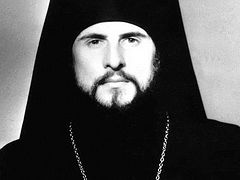
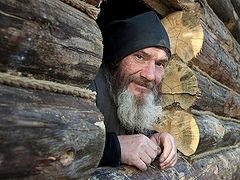
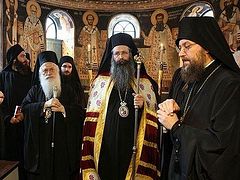
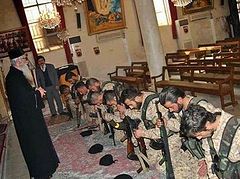
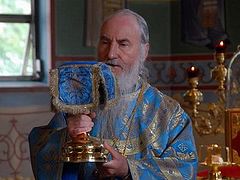
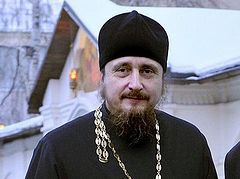
i am orthodox christian but it is only naming because i usually omit god rule.
i have the following problems
1. conflict in at my wife
2. listening relaxation music
3.hallucination, night mars at night
4.i can't save money
5.i can't concentrate at praying
help me help me
tell me the ways how to fight devil?